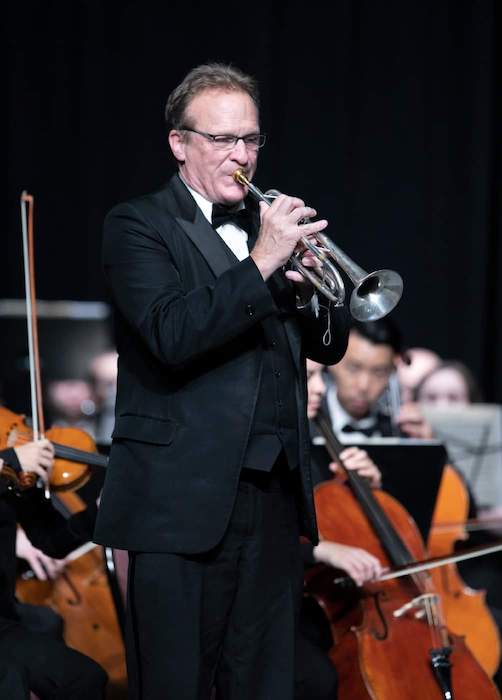Apollo Orchestra opens season with haste and bracing variety

The Apollo Orchestra opened its tenth-anniversary season Saturday night at the Georgetown Preparatory Visitation School’s Nolan Center—seemingly determined to forestall boredom, with a soloist, an historically varied program, guest spots from a dance troupe and, for much of the concert, an insistence on dash and movement.
But ensuring the audience is never bored is not quite the same thing as enthralling them; only when the performance started taking its time did spending it become truly diverting.
George Frideric Handel’s overture to his 1748 oratorio Solomon was the curtain-raiser, with choreographic accompaniment from the Visitation School’s own enVISIon Dancers—an abstract pageant of butterfly-winged metamorphosis and eventual coronation that provided a diverting visual whirl.
Under conductor Stephen Czarkowski’s broad-stroke gestures, the playing tended toward a comfortable sheen, the opening dotted rhythms only leisurely snapped, the sound cushioned throughout. (If prevailing early-music performance practice aims for stark, film-noir chiaroscuro, this was closer to flatteringly soft-edged studio lighting.) Though rhythm and intonation could get skittish at softer volumes—an issue that recurred throughout the afternoon—the otherwise robust sound was the highlight and, indeed, the apparent objective of the performance.
Assistant conductor Jeffry Newberger took the podium for Bedřich Smetana’s “The Moldau,” the rippling, thoroughly Romantic river journey from his larger symphonic cycle Má vlast. (The program listed all six portions of the cycle, temporarily threatening a truly epic concert.) Here, too, a big, healthy sound prevailed, coupled to a drive disinclined to linger over a phrase or a musical image. Newberger showed vigor and authority in keeping to the itinerary, but the forward motion of the current won out over any possibility of more contemplative sightseeing.
Such restlessness to reach the destination permeated Alexander Arutiunian’s 1950 Trumpet Concerto, which transmutes Armenian folk influence into symphonic pop, showy cascades, sultry harmonies, and slinky rhythms anchored by a killer melodic hook.
Trumpeter Chris Gekker had the right attitude, combining offhand aplomb with a tone appropriately reminiscent of, say, Harry James. But the concert’s tendency toward the brisk here became extreme. Czarkowski’s beat flew headlong into the music’s turns; the whole performance felt just a little too fast, even when it wasn’t. Right up to the end, signposts and big moments landed with more haste than flair.
Gekker’s encore was more relaxed, with tubist Willie Clark stepping out from the ensemble to duet on a slip of New Orleans jazz, after which soloist and orchestra serenaded the orchestra’s president and primary funder, Robert Downing, with “Happy Birthday.”
Thankfully, the concert’s second half eased the pace. Czarkowski introduced Mozart’s Symphony no. 39 in E-flat Major (K. 543) as “forgotten” next to its two great contemporaries, the brooding 40th and the imposing 41st. Given the composer’s abiding ubiquity, it’s debatable whether any Mozart work can claim unsung status; but, perhaps aiming to prove the 39th’s monumental status, Czarkowski approached the piece with what proved to be salutary breadth and deliberateness.
With horizontal and vertical energies finally in balance, the tempo provided enough space for articulations to land more sharply and rests to breathe more expressively, making the music’s back-and-forth rhetoric and wit prominent and clear. Even the snappiest dialogue needs time to land.
Violinist Cho Liang Lin joins the Apollo Orchestra 7:30 p.m. October 18 at Bethesda’s Church of the Little Flower. apolloorchestra.com
Matthew Guerrieri is a musician and critic who has written regularly for the Boston Globe, NewMusicBox, and Playbill, among others. He is the author of The First Four Notes: Beethoven’s Fifth and the Human Imagination and a book-length study of the Doctor Who serial “Horror of Fang Rock” for Obverse Books’ Black Archive series. After many years in and around Chicago and Boston, he now lives in Washington, D.C.
